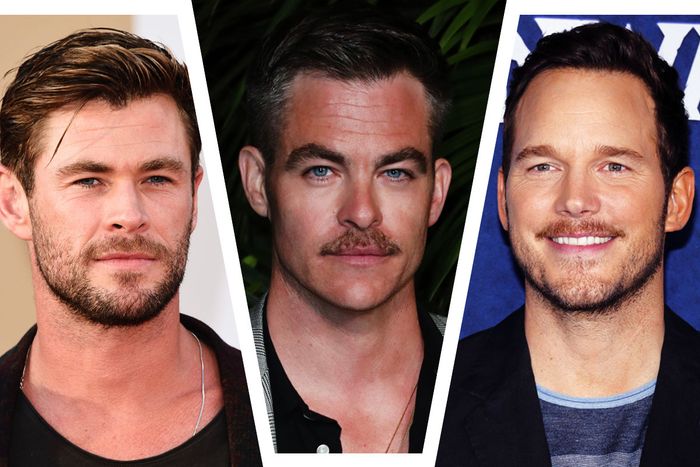
Here we go again. Two weeks away from the election, and the nation is gripped by a divisive, political discourse; one that comes around cyclically, as if by constitutional mandate. Twitter wants to know: Who is the “worst Chris”? The question refers, of course, to the white Hollywood Chrises who star in mostly Marvel superhero blockbusters (the exception being Star Trek and Wonder Woman Chris, Pine). It feels redundant to even outline the concept, so ubiquitous is the worst-Chris discourse — or Chriscourse. Every few months, someone makes the same revelation, that gee, there sure are a lot of often-shirtless white dudes named Chris working in movies nowadays. They are: Hemsworth, the Australian one; Evans, the nude-leak one; Pine, the aforementioned one; and Pratt, the more conservative one. Still, as though she were the first person to realize that “ew, moist sure is a gross word, isn’t it?,” TV writer Amy Berg tweeted a grid of the Four Chrismen of the Chrispocalypse with the caption, “One has to go.”
This is what sportsmen in basketball call an “easy bucket” (I made that up, don’t look it up). Want viral engagement and some RTs? Fire up the Chriscourse. Berg’s proposition is rhetorical, meant to line up quick-dunks (another basketball term, don’t fact-check this) because Chris Pratt is widely acknowledged to be the Worst Chris. Berg’s tweet gave people an opportunity to voice and reaffirm this opinion. For those who don’t follow these things because they lead fulfilling lives, the perceived strikes against Pratt include but are not limited to: his Don’t Tread on Me shirt, his attendance at an Evangelical megachurch with intolerant beliefs about LGBTQ marriage and other religions, and his stubbornly quiet political stance, which recently included skipping an Avengers fundraiser for Joe Biden featuring many other cast members (including Democrat Chris Evans).
And of course, there’s the fact that Pratt and beloved actress Anna Faris divorced following eight years of marriage, after which Pratt quickly got engaged to and married Katherine Schwarzenegger. When Berg’s “One has to go” post went viral, Schwarzenegger came to her husband’s defense, responding in the comments to an E! News Instagram post about the Chriscourse, calling this whole thing “so yesterday”:
Is this really what we need? There’s so much going on in the world and people struggling in so many ways. Being mean is so yesterday. There’s enough room to love all these guys. Love is what we all need not meanness and bullying. Let’s try that. 🙏♥️
Pratt’s co-stars also came to his defense, with Zoe Saldana supportively quoting Tupac, Mark Ruffalo trying to draw our collective attention back to the election, and Robert Downey Jr. endorsing most of Pratt’s beliefs.
Schwarzenegger is right, actually: The Chris discourse really is “so yesterday.” Maybe there was a time when the “worst Chris” conversation was necessary, but we are well past that moment. A decade ago, we were in the early throes of the Marvel-fication of Hollywood, a shift that forever changed tentpoles. Two Chris vehicles — Thor and Captain America: The First Avenger — were both released in 2011; Avengers would follow the next year, weaving them together and nailing down the MCU’s serialized, intertwining approach to its blockbusters. Many critics felt that this almost television-inspired approach to moviemaking led to a certain, numbing sameness, structurally and aesthetically. That so many of these Marvel movies — as well as parallel hits at the time like J.J. Abrams’s Star Trek reboot — were fronted by similar-looking buff boys named Chris was a perfect encapsulation of our fascination and unease with this changing movie landscape. The Chriscourse was a way to point it all out and process it. Fast-forward and films like Black Panther and Spider-Man: Into the Spider-Verse have made the term “Marvel movie” far less white and homogenous than what the Chrises once symbolized. The discourse was once a useful rhetorical tool for processing what movies looked like; now they no longer serve that function, particularly in a year when there aren’t even any Marvel movies at all. To continue to fixate on these four bland vanilla wafers is to perpetuate their centrality in Hollywood, and I, for one, would really rather not.
Another reason why we have to put the Chriscourse to bed once and for all is that Chris Pratt isn’t actually that much of an outlier in the assumed conservatism with which some fans take issue. Contrary to popular conservative conspiratorial belief, Hollywood isn’t one big liberal cesspool; as Katharine McPhee, Ice Cube, and Kirstie Alley have demonstrated, there are many Republicans and Trump supporters in their ranks. It’s great that Chris Evans is an outspoken Democrat, but the job of all of these guys is to be a himbo onscreen and a millionaire off, and it’s weird to want more from them instead of amplifying the voices of actual activists who do politics as their job. That’s not to say we should just remain silent when celebs are being actively harmful, dumb, or fascist-adjacent. When it comes to the Chrises, it’s fine to ponder how the once-dopey puppy poster boy Andy Dwyer managed to take the Star-Lord role away from Glenn Howerton, thus setting us on a different, darker timeline where Glenn Howerton is not a movie star and instead, we have Trump and COVID and the lame Jurassic reboots. But do we need to have a twice-yearly referendum on whether or not this solidifies him as the worst of his tribe? I’d argue “no.”
The Chris Discourse is stale and tired. It’s a vestigial limb leftover from the days when the words “internet boyfriend” were a thing. We have evolved past the need. To rank Chrises is cringe. It’s hack. It’s not funny and it’s nothing new. And besides, we all know there are only two good Chrises in the world: Chris … pin Glover and Ruth’s Chris Steak House.


